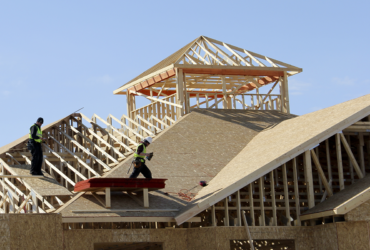Building permits and housing starts were disappointing to start the year, according to the latest data from the Census Bureau.
- Building Permits. Privately-owned housing units authorized by building permits were up slightly to a seasonally adjusted annual rate of 1,339,000 in January, up 0.1% from December but down a whopping 27.3% when compared to the same time last year.
- Housing Starts. Privately-owned housing starts fell to a seasonally adjusted annual rate of 1,309,000, down 4.5% from December and down 21.4% from the same time last year.
- Housing Completions. Privately-owned housing completions were up to a seasonally adjusted annual rate of 1,406,000, up 1.0% from December and up 12.8% from the same time last year.
Swing & A Miss. Economists predicted that building permits would see a bigger 1.0% increase and that starts would only fall by 1.0%.
South On Top. The South continues to propel new construction nationwide representing 57% of all building permits, 58% of housing starts, and 53% of housing completions.
- On the other end of the spectrum, the Northeast made up just 8% of building permits, 9% of housing starts, and just 8% of housing completions.
Inflation Data Disappoints

Economists were optimistic heading into January’s producer price index print for January. However, like housing data, this inflation data would prove to be disappointing, according to the latest report from the Bureau of Labor Statistics.
- Y-O-Y: The Producer Price Index for final demand increased 6.0% when compared to the same time last year, down 0.5% from December and the lowest reading since July 2021.
- M-O-M: Producer prices were up 0.7% from December, well above the 0.2% drop last month and the biggest increase since June.
Big Miss. Economists really missed the mark in January with predictions that the monthly increase would be only 0.4% and the annualized rate would slow to 5.4%.
Good News. Producer prices fell under the rate of consumer prices for the first time since December 2020.
Jobless Claims Stay Under 200k

Jobless claims also defied economist predictions with a slight dip for the week ending February 11th, according to the Department of Labor.
- Initial Claims. Seasonally adjusted initial claims fell to 194,000, a decrease of 1,000 from the previous week’s revised level. Economists thought claims would jump to 200k.
- Continuing Claims. The advance number for seasonally adjusted insured unemployment jumped to 1,696,000 for the week ending February 4th, an increase of 16,000 from the previous week’s revised level and slightly higher than economist predictions of 1.695M.
Cali Drop. California reported the biggest drop in initial claims with 3,696 fewer claims followed by Pennsylvania (-2,684) and Illinois (-1,906).
Mortgage Rates Increase For Second Week

Mortgage rates climbed for the second week in a row after hitting a four-month low, according to the latest data from Freddie Mac.
- The 30-year fixed averaged 6.32% for the week ending February 16th, this is up 20 basis points from last week and is up 240 basis points from one year ago.
- The 15-year fixed averaged 5.51% for the week ending February 16th, up 16 basis points from last week and 236 basis points from one year ago.
MBS. Mortgage Backed Securities did not have a great week with the UMBS 30YR 5.0 falling 78 cents to close out the week ending February 16th at $98.58 according to Mortgage News Daily.
Analysis. Sam Khater, Freddie Mac’s Chief Economist, noted that economic resiliency is bad news for rates. “The economy is showing signs of resilience, mainly due to consumer spending, and rates are increasing. Overall housing costs are also increasing and therefore impacting inflation, which continues to persist.”






Got a Questions?
Find us on Socials or Contact us and we’ll get back to you as soon as possible.